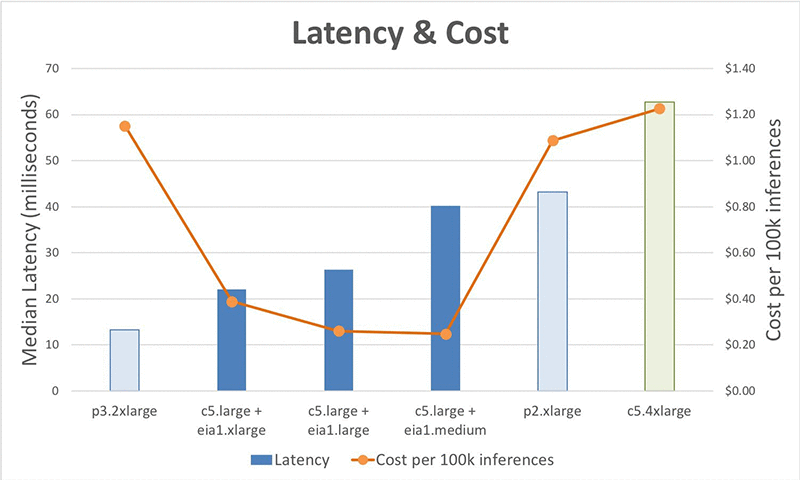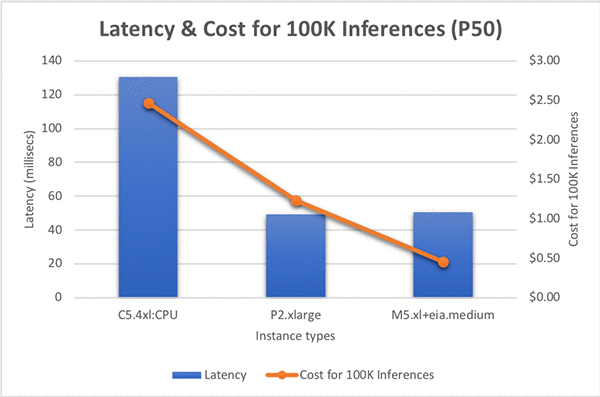Artificial Intelligence
Category: Apache MXNet on AWS
BERT inference on G4 instances using Apache MXNet and GluonNLP: 1 million requests for 20 cents
Bidirectional Encoder Representations from Transformers (BERT) [1] has become one of the most popular models for natural language processing (NLP) applications. BERT can outperform other models in several NLP tasks, including question answering and sentence classification. Training the BERT model on large datasets is expensive and time consuming, and achieving low latency when performing inference […]
Serving deep learning at Curalate with Apache MXNet, AWS Lambda, and Amazon Elastic Inference
Note: Amazon Elastic Inference is no longer available. Please see Amazon SageMaker for similar capabilities. This is a guest blog post by Jesse Brizzi, a computer vision research engineer at Curalate. At Curalate, we’re always coming up with new ways to use deep learning and computer vision to find and leverage user-generated content (UGC) and […]
Running Java-based deep learning with MXNet and Amazon Elastic Inference
Note: Amazon Elastic Inference is no longer available. Please see Amazon SageMaker for similar capabilities. The new release of MXNet 1.4 for Amazon Elastic Inference now includes Java and Scala support. Apache MXNet is an open source deep learning framework used to build, train, and deploy deep neural networks. Amazon Elastic Inference (EI) is a […]
Reducing deep learning inference cost with MXNet and Amazon Elastic Inference
Note: Amazon Elastic Inference is no longer available. Please see Amazon SageMaker for similar capabilities. Amazon Elastic Inference (Amazon EI) is a service that allows you to attach low-cost GPU-powered acceleration to Amazon EC2 and Amazon SageMaker instances. MXNet has supported Amazon EI since its initial release at AWS re:Invent 2018. In this blog post, […]
Run ONNX models with Amazon Elastic Inference
At re:Invent 2018, AWS announced Amazon Elastic Inference (EI), a new service that lets you attach just the right amount of GPU-powered inference acceleration to any Amazon EC2 instance. This is also available for Amazon SageMaker notebook instances and endpoints, bringing acceleration to built-in algorithms and to deep learning environments. In this blog post, I […]
Introducing Dynamic Training for deep learning with Amazon EC2
Today we are excited to announce the availability of Dynamic Training (DT) for deep learning models, or DT for short. DT allows deep learning practitioners to reduce model training cost and time by leveraging the cloud’s elasticity and economies of scale. Our first reference implementation of DT is based on Apache MXNet, and is open sourced […]
Model Server for Apache MXNet v1.0 released
AWS recently released Model Server for Apache MXNet (MMS) v1.0, featuring a new API for managing the state of the service, which includes the ability to dynamically load models during runtime, to lower latency, and to have higher throughput. In this post, we will explore the new features and showcase the performance gains of the […]
Using deep learning on AWS to lower property damage losses from natural disasters
Natural disasters like the 2017 Santa Rosa fires and Hurricane Harvey cost hundreds of billions of dollars in property damages every year, wreaking economic havoc in the lives of homeowners. Insurance companies do their best to evaluate affected homes, but it could take weeks before assessments are available and salvaging and protecting the homes can […]
Pixm takes on phishing attacks with deep learning using Apache MXNet on AWS
Despite numerous cybersecurity efforts, phishing attacks are still on the rise. Phishing is a form of fraud where perpetrators pretend to be reputable companies and attempt to get individuals to reveal personal information, such as passwords and credit card numbers. It’s the most common social tactic. 93 percent of all breaches today start with phishing […]
Curalate makes social sell with AI using Apache MXNet on AWS
Curalate helps brands convert social influence into sales. The Philadelphia-based startup makes it easy for digital-savvy consumers to make associations between products they see on social channels and where they can buy the very same products. Previously, consumers had to hunt through online catalogs on their own to find a specific product from a social […]









